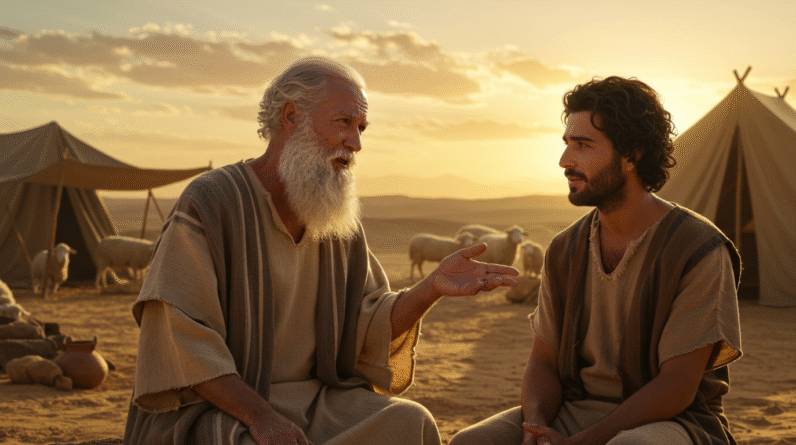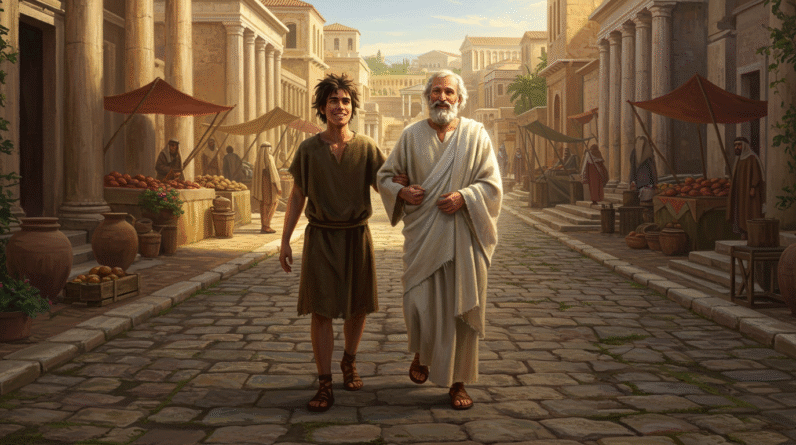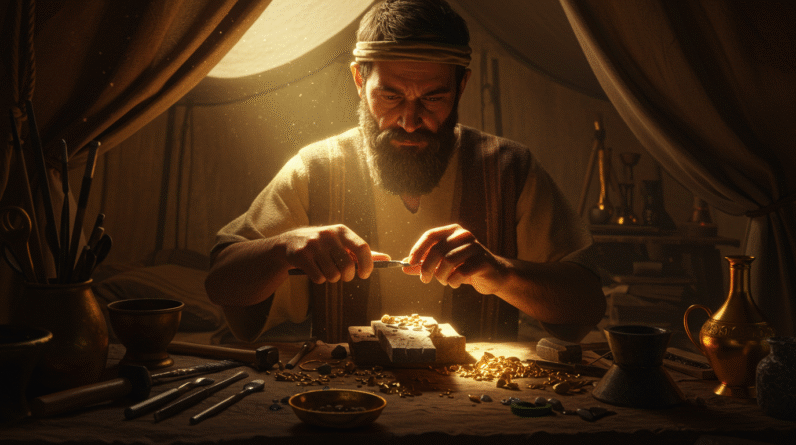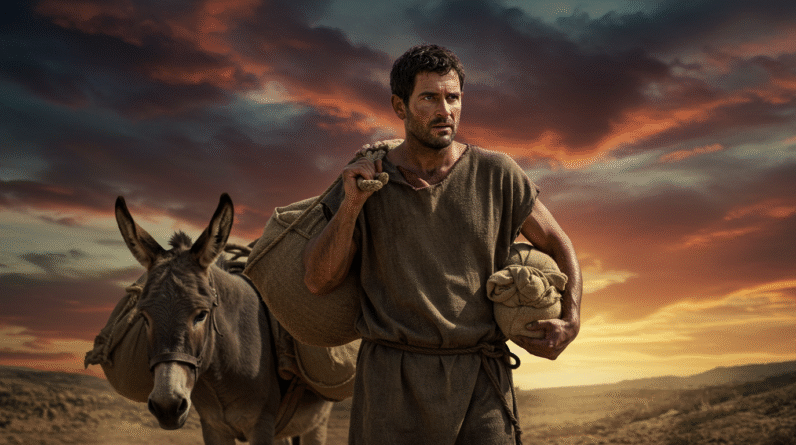Explore the inspiring story of Zelophehad’s daughters—bold advocates for justice in biblical times. Discover courage, unity, and change in their groundbreaking tale.
Zelophehad’s Daughters: Bold Advocates in Biblical Inheritance Stories

Introduction
Imagine a time when women had little to no voice in matters of land and inheritance, yet five sisters dared to challenge the norm. Zelophehad’s daughters stand out as remarkable proponents of justice and equality in biblical times. Rooted in the story told in the Old Testament, these sisters not only fought for their rights but also set a precedent for future generations, making their stand a compelling narrative of courage and advocacy. Their journey through ancient patriarchal systems illuminates the profound impact of stepping forward with conviction, propelling them into the realm of influential biblical characters.
Their Story in the Bible
Zelophehad’s daughters—Mahlah, Noah, Hoglah, Milcah, and Tirzah—are prominently featured in Numbers 27:1-11. Born into the tribe of Manasseh, the daughters were faced with a notable challenge when their father, Zelophehad, passed away without leaving behind a male heir. In their culture, inheritance was typically passed from father to son or nearest male relatives, effectively leaving these sisters without any claim to their family land.
Undeterred by the legal limitations of their time, these women approached Moses, Eleazar the priest, and the entire assembly at the entrance of the Tent of Meeting. The daughters presented their case, arguing that their father’s name should not vanish simply because he had no son. They requested a share of the inheritance meant for their father to preserve his legacy. Their plea was not only bold but revolutionary, as they advocated for a change in the status quo, seeking fairness in a system that systematically excluded them.
Impressed by their courage, Moses took their case before God, who affirmed the validity of their claim. The Lord instructed Moses to grant them their father’s inheritance and initiated a change in the law that would allow daughters to inherit if no sons were present (Numbers 27:6-8). This decision was a monumental shift in inheritance laws, highlighting the resonance of their appeal. Later, in Joshua 17:3-6, we see the realization of their desires with the actual allotment of land to Zelophehad’s daughters.
Lessons from Their Life
From the story of Zelophehad’s daughters, readers can draw three pivotal lessons. First, their story emphasizes the significance of advocacy. Through their fearless actions, these women teach us the power of standing up for what is just, even when faced with seemingly insurmountable societal structures. Their courage in approaching the highest authority in their community underscores the impact of speaking out with clarity and purpose.
Secondly, their narrative reveals the potential for change within established systems. By challenging existing inheritance laws, Zelophehad’s daughters highlighted how individuals can influence societal norms, paving the way for future modifications. This change was not only legalistic but also led to a broader contemplation of fairness and equality, demonstrating how meaningful reform is possible with perseverance and unwavering resolve.
Lastly, the sisters’ story encourages the importance of unity and familial solidarity. As sisters, they stood together, their unified front serving as a testament to the strength found in collaboration. Their collective determination exemplifies how working together can amplify one’s voice and influence, driving home the idea that unity can lead to successful advocacy.
Connection to Today’s World
In today’s world, the story of Zelophehad’s daughters remains relevant, offering insights into challenges that reflect modern struggles for equality and justice. In many contemporary settings, individuals and communities are still fighting for equal rights, whether concerning gender, race, or social class. The daughters’ action encourages those in similar situations to persevere and seek change, illustrating that difficult paths can lead to significant outcomes when faced with integrity and determination.
Moreover, their story mirrors ongoing discussions about women’s rights and representation. In many cultures, women are still working to secure equal footing in various sectors, from politics to business. The example of Zelophehad’s daughters serves as a beacon, reminding us of the strides that can be made when voices are raised with clarity and unity for equitable treatment.
Finally, their tale resonates with the push for institutional reforms. Just as Moses acted upon divine instruction to alter the laws, today’s societies can reflect on existing policies and practices, continuously challenging outdated systems for the betterment of society. The sisters’ resolve inspires current and future generations to pursue justice and equality, keeping the momentum for change alive.
Key Bible Verse
“The daughters of Zelophehad son of Hepher, the son of Gilead, the son of Makir, the son of Manasseh, belonged to the clans of Manasseh son of Joseph. The names of the daughters were Mahlah, Noah, Hoglah, Milcah, and Tirzah. They came forward…” (Numbers 27:1)
This verse is significant because it marks the beginning of a pivotal moment for gender equality in biblical history. It signifies the move of these sisters from the margins to the center, underlining their courage and the beginning of a shift in societal norms that would affect generations to come.
Thought-Provoking Question
When you encounter inequality, do you find yourself equipped with the courage and unity shown by Zelophehad’s daughters to seek justice and enact change?
Historical/Cultural Context
The story of Zelophehad’s daughters is set against the backdrop of a patriarchal society where lineage and inheritance followed the male line almost exclusively. During this time, the Hebrew culture was governed by nomadic and tribal systems, where land was a critical factor for survival and prosperity. Understanding this cultural context highlights the extraordinary nature of the daughters’ actions—their breakthrough not only defied gender norms but also introduced a shift in understanding familial rights in inheritance.
Comparison with Other Characters
The daughters’ story can be compared to that of Esther, another biblical figure who boldly stepped into the forefront to advocate on behalf of her people. Although Esther operated in a different context, both stories underscore the power of women taking decisive action for justice. Esther risked her position to save the Jewish people from annihilation, proving that courage in the face of adversity can lead to salvation and transformation. Just like Zelophehad’s daughters, Esther’s tale reminds us of the profound impact of the individual voice in societal reform.
Prayer
Heavenly Father, grant us the boldness and unity of Zelophehad’s daughters. Help us to stand up for justice and equality in our lives, and to be agents of change where needed. May we continually seek Your guidance in advocating for truth and righteousness. Amen.







